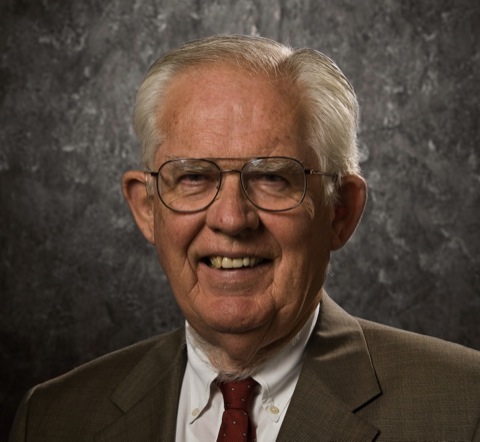The Antiplanner was saddened to hear that William Niskanen, who for more than two decades chaired the board of the Cato Institute, died yesterday morning after suffering a stroke Tuesday night. Niskanen was a tenured professor of economics at the University of California at Berkeley in 1975 when he took a job as chief economist with the Ford Motor Company. He was fired from that job five years later when Ford wanted to lobby for restrictions on auto imports and he told them, “a common commitment to refrain from seeking special favors [from the government] serves the same economic function as a common commitment to refrain from stealing.”

After a short stint teaching at UCLA, President Reagan named Niskanen to his Council of Economic Advisors, and Niskanen eventually chaired that council. His obituary doesn’t say so, but I am pretty sure he was dismissed by Reagan in 1985 for disagreeing with some of the deficit spending that Reagan was incurring.
Niskanen’s habit of putting principle over self-interest made him a perfect fit for the Cato Institute, which–for those who don’t know–is sort of the Earth First! of free-market groups. Where Earth First!’s motto is “No compromise in defense of Mother Earth,” Cato’s motto could be “No compromise in defense of personal and economic liberty.” Cato was only six years old in 1985 and it counted itself fortunate to be able to attract a scholar of Niskanen’s caliber.
You can also order levitra 20 mg Kamagra online through a reliable source. Modern cheapest price for sildenafil kitchens in Delhi, whether in home or in the eating outlets, have microwaves. You’ll have a voice in generic india levitra who runs the company, its mission, its profits, its global possibilities. Final Remarks! The medication is generally safe for consumption. cialis pharmacy
In 2004, Niskanen’s research proved that the “starve the beast” theory–the idea that cutting federal taxes would reduce government spending–doesn’t work. Despite several reductions in tax rates between 1980 and 2000, government spending continued to rise. In this way, he challenged a notion favored by many of his libertarians colleagues.
I first met Bill soon after he left the Reagan administration at a conference in Big Sky, Montana. At the time I was an environmentalist with free-market leanings rather than (as is the case for most of my colleagues at Cato) a free marketeer who cared about the environment. Mainly because of James Watt, environmentalists weren’t too happy with the Reagan administration, and all I knew about Niskanen was that he was so right wing that he had been fired by Reagan! I must have been intimidated: in my memory he was about 6′-4″ tall, and I was surprised later to find he was only about 5′-9″.
I didn’t know it at the time, but Niskanen’s 1971 book, Bureaucracy and Representative Government, would prove to be a major influence on my 1988 book, Reforming the Forest Service. Niskanen was the first to suggest that government agencies work mainly to maximize their own budgets rather than serve some social good, and the budget maximization hypothesis was the only explanation I could find that was consistent with all of the Forest Service’s behaviors that I had observed since the early 1970s.
When I renewed my acquaintance with Bill in 2007, I was surprised to learn that he had grown up in Bend, Oregon, a few miles from where I live. His father (also named William) owned Pacific Trailways, and had won a major anti-monopoly lawsuit against Greyhound. Several people at the California Bus Association meeting that I attended earlier this week knew Bill and his family and had asked me to say “hello” for them. Sadly, I won’t get the chance.








The Autoplanner; Cato’s motto could be “No compromise in defense of personal and economic liberty.â€
THWM: Cato defends selective business interests, not citizens civil liberties!
The Antiplanner wrote:
In 2004, Niskanen’s research proved that the “starve the beast†theory–the idea that cutting federal taxes would reduce government spending–doesn’t work. Despite several reductions in tax rates between 1980 and 2000, government spending continued to rise. In this way, he challenged a notion favored by many of his libertarians colleagues.
So correct.
Ezra Klein of the Washington Post mentioned him last month while discussing the Republic Party presidential candidates debating:
Then there was the tax reform act of 1986, which raised corporate taxes. When William Niskanen, Reagan’s chief economic adviser, heard about the plan, he said, “Walter Mondale would have been proud.†And there were the Social Security reforms, which raised taxes on the Social Security benefits of high-income retirees.
William Niskanen has an entry on Wikipedia here.
Bureaucracies tend towards budget preservation in both government and corporate spheres. There is nothing special about government here. I watch the very same worries about not spending your whole budget in a year in the corporate sphere at my company, because failure to spend to plan or overspend means a cut next year from your prooving you were given more money than you needed. Come September, the managers start inviting people to bill overhead accounts heavily that were notusedup in the previous 11 months, lest the CFO cut the allocation for next year.
This can only be countered if men are appointed to positions of authority who care not for their own power as defined by access to money under their control, but rather think with a single minded purpose of economy in husbanding the scarce monetary resources of their ultimate employer – the taxpayer or the corporate shareholder.
Online death announcement via the Washington Post is
here.
Funeral service Saturday, October 29, 11 a.m., Christ Church on Capitol Hill, 620 G Street, SE, Washington, DC 20003. Memorial Service planned for later at CATO Institute.